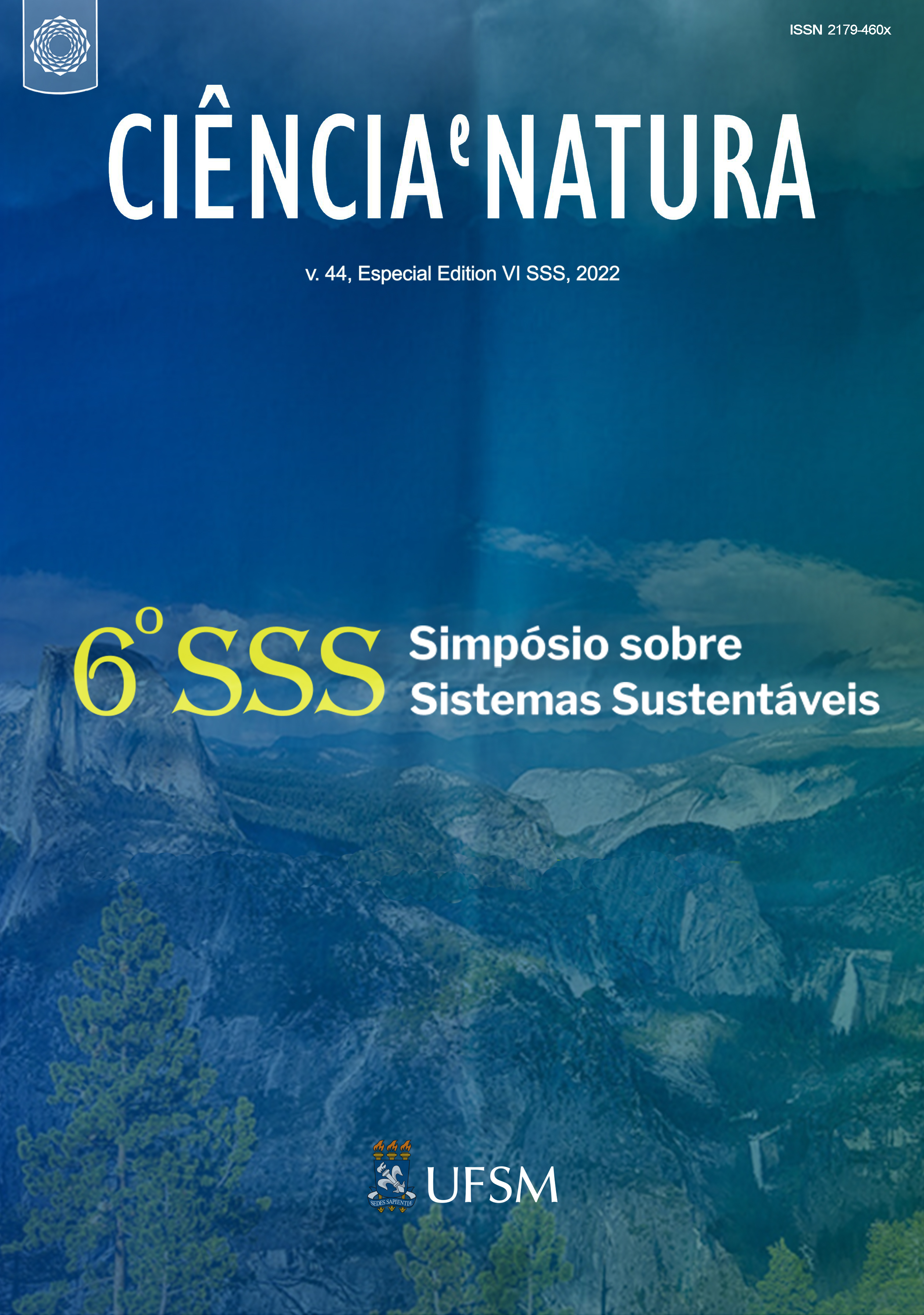Stationarity of pluviometric series of the state of Ceará, Brazil
DOI:
https://doi.org/10.5902/2179460X68824Keywords:
Climate change, Non-parametric tests, Water resources managementAbstract
This paper aims to investigate stationarity in the pluviometric historical series of the state of Ceará, Brazil. After selection, the gaps were filled using linear regression. The Mann-Kendall and Pettitt tests were conducted with the help of the package “trend”, in R programming language. After applying the tests, it was noted that most of the selected stations presented stationary behavior, except for Chorozinho, which presented a p-value of 0,018 for the Mann-Kendall test, i.e., rejecting the null hypothesis of stationarity at 5% significance and presenting a positive monotone trend. For the Pettitt test, the station presented a p-value of 0,022, thus rejecting the null hypothesis of lack of change point at 5% significance, the change point being in the year of 1982. It is concluded that it was possible to analyze the stationarity of historic pluviometric series and have a better understanding of the hydrological regime of the region.
Downloads
References
HAJANI E, RAHMAN A. Characterizing changes in rainfall: a case study for New South Wales, Australia. International Journal of Climatology 38, pp. 1452 – 1462. 2018.
HIDROWEB [internet]. Brasil: Agência Nacional de Águas e Saneamento Básico. Disponível em: http://www.snirh.gov.br/hidroweb/serieshistoricas. Acesso em: 11 mar. 2021.
INSTITUTO BRASILEIRO DE GEOGRAFIA E ESTATÍSTICA. Ceará. Disponível em: https://www.ibge.gov.br/cidades-e-estados/ce.html. Acesso em: 18 jan. 2021. 2020.
JULIANI BHT, FERREIRA IA, OKAWA CMP; ZUFFO AC. Mudanças nos padrões de precipitação para a cidade de Tibagi, Paraná. Anais do XXIII Simpósio Brasileiro de Recursos Hídricos. Foz do Iguaçu. 2019.
KENDALL MG. Rank correlation measures. Charles Griffin, London, 736 p. 1975.
MANN HB. Non-parametric tests against trend. Econometrica 13, pp. 245 – 259. 1945.
MARENGO JA. Mudanças climáticas, condições meteorológicas extremas e eventos climáticos no Brasil. Disponível em: http://www.fbds.org.br/cop15/FBDS_MudancasClimaticas.pdf. Acesso em: 2 fev. 2020. 2016.
MARENGO JA, ALVES LM, BESERRA EA, LACERDA, FF. Variabilidade e mudanças climáticas no semiárido brasileiro. Disponível em: http://plutao.dpi.inpe.br/col/dpi.inpe.br/plutao/2011/09.22.18.52.30/doc/Marengo_Variabilidade.pdf. Acesso em: 2 fev. 2020. 2011.
MORO MF, MACEDO MB, MOURA-FÉ MM, CASTRO ASF, COSTA RC. Vegetação, unidades fitoecológicas e diversidade paisagística do estado do Ceará. Rodriguésia 66(3): 717-743. 2015.
NAGHETTINI M, PINTO EJA. Hidrologia Estatística. CPRM – Serviço Geológico do Brasil. Disponível em: http://rigeo.cprm.gov.br/xmlui/handle/doc/454. Acesso em: 18 jan 2021. 2007.
OLIVEIRA LFC, FIOREZE AP, MEDEIROS AMM, SILVA MAS. Comparação de metodologias de preenchimento de falhas de séries históricas de precipitação pluvial anual. Revista Brasileira de Engenharia Agrícola e Ambiental v.14, n.11, p.1186–1192. 2010.
PETTITT AN. A non-parametric approach to the change-point problem. Applied Statistics 28, pp. 126 – 135. 1979.
POHLERT T. Package ‘trend’. CRAN Repository. Disponível em: https://cran.r-project.org/web/packages/trend/trend.pdf. Acesso em: 20 de jan de 2021. 2020.
SALVIANO MF, GROPPO, JD, PELLEGRINO, GQ. Análise de Tendências em Dados de Precipitação e Temperatura no Brasil. Revista Brasileira de Meteorologia, v. 31, n. 1, p. 64-73. 2016.
SECRETARIA DOS RECURSOS HÍDRICOS DO CEARÁ. Plano de Ações Estratégicas de Recursos Hídricos do Ceará – PAE – RH. Disponível em: https://www.srh.ce.gov.br/wp-content/uploads/sites/90/2018/07/PLANO-DE-ACOES-ESTRATEGICAS-DE-RECURSOS-HIDRICOS-CE_2018.pdf. Acesso em: 15 abr. 2021. 2018.
SNEYERS R. Sur l’analyse statistique des séries d’observations. Organisation Météorologique Mondial, p. 192, Genebra. 1975.
STOTT PA. Attribution of regional-scale temperature changes to anthropogenic and natural causes. Berkshire, UK: Hadley Centre for Climate Prediction and Research. 2003.
ULIANA EM, SILVA DD, RODRIGUES BS, CORRÊDO LP. Análise da tendência de séries históricas de vazão e precipitação: uso de teste estatístico não paramétrico. Revista Ambiente e Água, vol. 10. 2015.
ZUFFO AC. O Sol, o motor das variabilidades climáticas. Revista DAE, 198ª ed. 2015.
Published
Versions
- 2022-04-20 (2)
- 2022-04-04 (1)
How to Cite
Issue
Section
License
Copyright (c) 2022 Ciência e Natura

This work is licensed under a Creative Commons Attribution-NonCommercial-ShareAlike 4.0 International License.
To access the DECLARATION AND TRANSFER OF COPYRIGHT AUTHOR’S DECLARATION AND COPYRIGHT LICENSE click here.
Ethical Guidelines for Journal Publication
The Ciência e Natura journal is committed to ensuring ethics in publication and quality of articles.
Conformance to standards of ethical behavior is therefore expected of all parties involved: Authors, Editors, Reviewers, and the Publisher.
In particular,
Authors: Authors should present an objective discussion of the significance of research work as well as sufficient detail and references to permit others to replicate the experiments. Fraudulent or knowingly inaccurate statements constitute unethical behavior and are unacceptable. Review Articles should also be objective, comprehensive, and accurate accounts of the state of the art. The Authors should ensure that their work is entirely original works, and if the work and/or words of others have been used, this has been appropriately acknowledged. Plagiarism in all its forms constitutes unethical publishing behavior and is unacceptable. Submitting the same manuscript to more than one journal concurrently constitutes unethical publishing behavior and is unacceptable. Authors should not submit articles describing essentially the same research to more than one journal. The corresponding Author should ensure that there is a full consensus of all Co-authors in approving the final version of the paper and its submission for publication.
Editors: Editors should evaluate manuscripts exclusively on the basis of their academic merit. An Editor must not use unpublished information in the editor's own research without the express written consent of the Author. Editors should take reasonable responsive measures when ethical complaints have been presented concerning a submitted manuscript or published paper.
Reviewers: Any manuscripts received for review must be treated as confidential documents. Privileged information or ideas obtained through peer review must be kept confidential and not used for personal advantage. Reviewers should be conducted objectively, and observations should be formulated clearly with supporting arguments, so that Authors can use them for improving the paper. Any selected Reviewer who feels unqualified to review the research reported in a manuscript or knows that its prompt review will be impossible should notify the Editor and excuse himself from the review process. Reviewers should not consider manuscripts in which they have conflicts of interest resulting from competitive, collaborative, or other relationships or connections with any of the authors, companies, or institutions connected to the papers.






